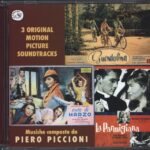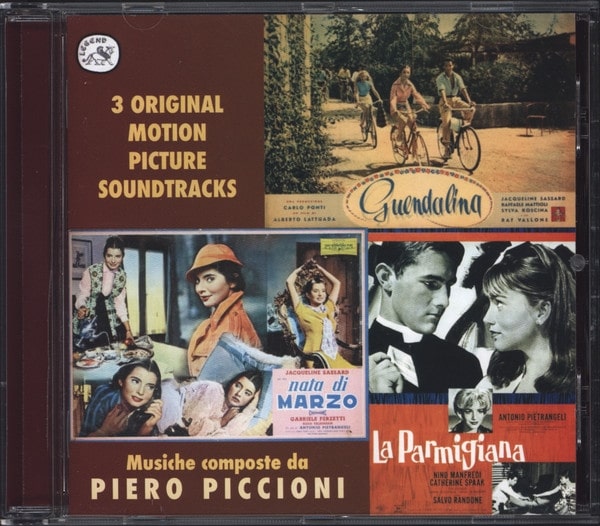3 Commedie all’Italiana della fine degli anni ’50, inizio ’60 disponibli per la prima volta su CD. I primi due film, che vedono nel cast la splendida attrice francese Jacqueline Sassard, sono diretti da Alberto Lattuada e Antonio Pietrangeli. Il terzo, che vede una splendida e giovanissima Catherine Spaak è anche diretto da Antonio Pietrangeli. Piero Piccioni, talvolta accreditato come Piero Morgan ha composto tre colonne sonore emozionanti dallo stile Jazzistico.
Tracklist (incompleta: solo la Parmigiana)
Titoli (1:52)
Regalo ad una condizione (2:37)
cantano i 4+4 di Nora Orlandi
Il tango dell’invidia (1:42)
Selene (1:23)
arrangiamento di Piero Piccioni, cantano i 4+4 di Nora Orlandi
Un gesto eroico! (2:23)
Un difficile lavoro (3:05)
La sposa onesta, pura, illibata (2:47)
Un po’ di rossetto e la vita ricomincia (3:01)
cantano i 4+4 di Nora Orlandi
3 Comedies Italian Style of end ’50 and early ’60 available for the first time on any format. The first 2 movies, starring the beautiful French actress Jacqueline Sassard,,are directed by Alberto Lattuada and Antonio Pietrangeli. The 3rd one, starring a young and beautiful Catherine Spaak is also directed by Antonio Pietrangeli. Pero Piccioni, credited sometimes as Piero Morgan composed for these movies three moving and Jazz oriented scores.
GUENDALINA: When I first watched this film, I was shocked as hit by lightening and captivated instantly by the charm and beauty of Guendalina. Many scenes were printed in my brain and are still there vividly even now half a century later – such as the scene Guendalina appears in all-in-one tights dancing in front of Oberdan. After the release of this film, many girls rushed to shops to buy Jacqueline-Tights in Japan. The story is just a bittersweet memory of vacances but this film is one of the most impressive films I’ve ever seen due to the overpowering charms of Guendalina.
NATA DI MARZO: Jacqueline Sassard, the nymphet of Guendalina by Lattuada grows up. Her haute-bourgeoise path is the road paved by Antonioni to ennui and existential hell, but she’s not there quite yet, still in early innings and the zone of Michelangelo’s light hearted ‘younger brother’ Antonio Pietrangeli, very good at sophisticated intimist dramas and comedies about young moderns. He’s one of several youthful directors on the scene (see Luciano Emmer a couple entries up, and Valerio Zurlini, star Jacqueline’s husband in real life) already practicing what seems uncannily the ‘sixties’ style of youth movie. The story, such as it is, concerns a young couple much in love who start to drift apart and entertain alternative sexual scenarios only to drift back together in the final act without terribly much comittment except against the alternatives. Pietrangeli may have borrowed a page or two from Antonioni, but the opposite seems all but certain as well: Ferzetti, several years prior to L’Avventura is already playing the exact same character, a handsome but weak architect named Sandro (just as in the Antonioni Film), who ends up with Jacqueline just where he will with Monica Vitti a few years later.
LA PAMIGIANA: Dora, driven away from her town by malicious gossip following her first love affair, has a series of short-lived adventures until she falls in love with Nino, a small time crook. In Parma, a police officer courts her but she keeps thinking of Nino and makes up her mind to join him. But he has found a new lover and she becomes a prostitute.




